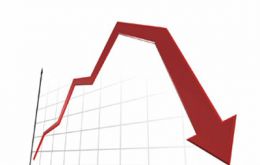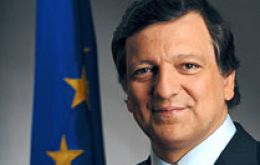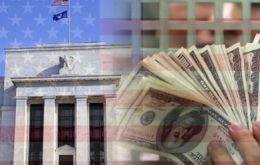MercoPress. South Atlantic News Agency
Economy
-
Tuesday, April 13th 2010 - 00:17 UTC
China reports first trade deficit in 6 years and drastic drop in bank lending

China reported a rare monthly trade deficit for the first time since May 2004. China’s foreign trade was up nearly 43% in March to over 231 billion USD, out of which exports accounted for about 112.1 billion and imports about 119.4 billion.
-
Monday, April 12th 2010 - 05:25 UTC
Argentine Central Bank props the Peso with Euro operations

Argentina has been forced to buy Euros in the local market to control the exchange rate of the US dollar relative to the Peso in a complicated move but necessary to avoid the risk of having additional Central Bank funds seized in New York.
-
Monday, April 12th 2010 - 05:23 UTC
Market test for Greece’s Euro zone and IMF 51 billion USD “soft” loan aid

European finance officials agreed Sunday to make an estimated 41 billion US dollars in loans available to Greece to help fight the threat of default. The loans would be charged at below-market rates to enable Athens to keep its borrowing costs down as it struggles to raise money to finance its runaway public debt.
-
Monday, April 12th 2010 - 05:07 UTC
Gibraltar’s air link with Madrid ceases as Spanish airline goes bankrupt

The bumpy journey of the Spanish airline Andalus Líneas Aéreas has come to an abrupt end following on the week end’s confirmation that the Madrid-Gibraltar air link had been indefinitely suspended, according to an article from the Gibraltar Chronicle.
-
Saturday, April 10th 2010 - 05:05 UTC
Rio Tinto joins competitors; agrees to three months iron ore contracts

Rio Tinto has followed rival mining firms and says it is negotiating new iron ore supply contracts priced for three months rather than a year. The move ends years of tradition and is seen as a demonstration of the power the miners have over their customers.
-
Saturday, April 10th 2010 - 05:02 UTC
Paraguay record crop of soybeans: 7.48 million tons

Paraguay announced a record 2009/2010 soybeans crop of 7.48 million tons, which is larger that the 6.8 million tons of 2007/08.
-
Saturday, April 10th 2010 - 04:55 UTC
Major US banks lowered debt levels to mask risks, claims Wall Street Journal

Major US banks temporarily lowered their debt levels just before reporting in the past five quarters, making it appear their balance sheets were less risky, the Wall Street Journal said, citing data from the Federal Reserve Bank of New York.
-
Saturday, April 10th 2010 - 04:49 UTC
US stocks DJ at 11.000 for the first time since September 2008

United States stocks rose Friday sending the Dow Jones Industrial Average briefly above 11,000 for the first time since September 2008, as growth in wholesale inventories added to signs the economy is strengthening.
-
Saturday, April 10th 2010 - 04:44 UTC
Argentina announces debt-swap and invites US corporations to invest

Argentine president Cristina Fernandez de Kirchner, CFK, speaking before the United States Chamber of Commerce confirmed that the debt-swap is to be launched between Wednesday and Thursday of next week and strongly praised Argentina’s conditions “for making business and investing”.
-
Saturday, April 10th 2010 - 04:42 UTC
Egypt lift restrictions on the import of Paraguayan beef

Paraguay’s Ministry of Foreign Affairs confirmed Friday Egypt had lifted the ban on Paraguayan beef exports which was imposed last December.
